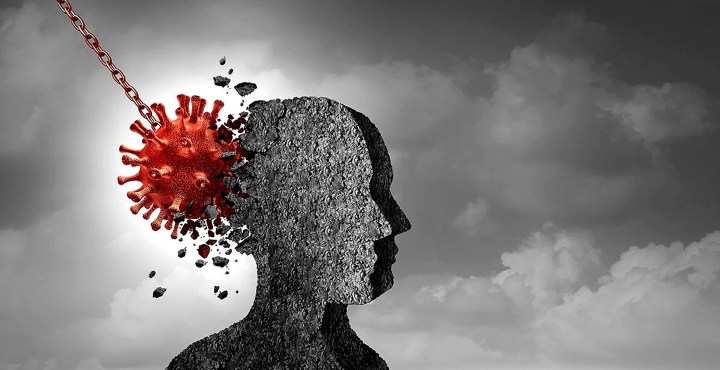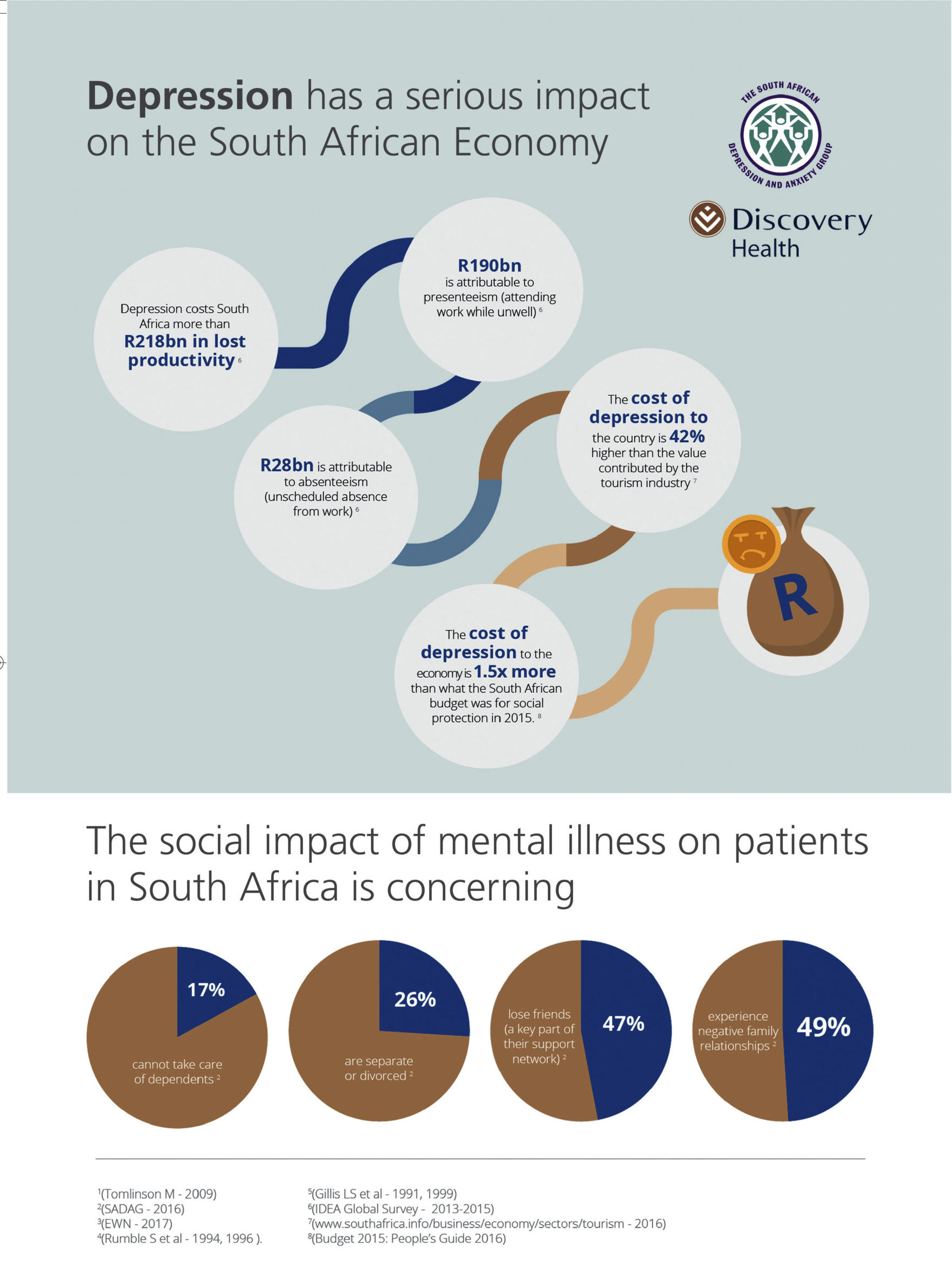Maverick Citizen Op-Ed
Mind field: SA urgently needs a new mental health policy

This is the first in a series of articles on mental health. Here the writers explain why, in May 2021, South Africa faces a serious mental health policy crisis. The National Mental Health Policy Framework and Strategic Action Plan (2013-2020) has lapsed; it requires an urgent update, specifically in light of Covid-19 and the growing mental health needs of the country.
Before Covid-19 came along and turned our lives upside down, mental health service delivery in low- and middle-income countries was already poor, with access to services hamstrung by stigma, inadequate infrastructure and poverty.
These shortfalls have become even more pronounced since Covid-19 hit, with health and social care systems ill-equipped to deal with the pandemic’s sudden and severe demands. Covid-19 has led to further disruptions in mental health services, together with increases in human rights violations against mental health care users.
Apart from threatening our lives and livelihoods, Covid-19 has also highlighted inequalities and deficiencies, divisions in class and race, gaps between persons with disability and those who are able-bodied, and disparities in access to care and resource distribution.
Covid-19 has affected mental health in wide-ranging ways, leaving no section of any society untouched. In October 2020, Dr Tedros Adhanom Ghebreyesus, director-general of the World Health Organization, said: “Good mental health is absolutely fundamental to overall health and wellbeing”, and that “Covid-19 has interrupted essential mental health services around the world just when they’re needed most. World leaders must move fast and decisively to invest more in life-saving mental health programmes during the pandemic and beyond.”
In South Africa, mental health was also riddled with challenges pre-Covid-19, with the South African College of Applied Psychology stating that the country’s mental wellbeing was in a state of severe crisis. Neuropsychiatric disorders are the third-highest contributor to the overall South African disease burden, after HIV/Aids and other infectious diseases, while there is also a high co-occurrence of HIV and mental illness.
It is estimated that up to six million South Africans could be suffering from post-traumatic stress disorder. This affects work and the economy, as explained in this 2016 article. Indeed, one survey estimated that depression alone costs the South African economy about R218-billion in lost workplace productivity due to workplace absenteeism and “presenteeism” (attending work while unwell).
Other challenges that continue to plague the mental health sector in South Africa include a lack of public awareness and regularly collected data, a continued overreliance on psychiatric hospitals, a shortage of mental health professionals, and inaccessible public healthcare for people with mental illness from South Africa’s most vulnerable communities.
Yet, despite the enormous societal and health burden that poor mental health is placing on the country, and despite strong policy and legislation being in place, mental health remains underprioritised compared with other areas of health, with only about 5% of the national health Budget allocated to it, along with insufficient resource allocations across provinces.
According to a Mental Health Investment Case report released in 2020 (the report is not available online but see a WHO guidance note here), 86% of the mental health Budget was spent in tertiary/institutional settings, while 24% of mental health patients who were discharged from inpatient care were readmitted within three months. This “revolving door” pattern of care consumed 18.5% of the total mental health Budget. All this while it is estimated that about one-third of South Africans will experience a common mental disorder in their lifetime, while 75% of those affected will not access available treatments.
 And now, in May 2021, South Africa is faced with a serious mental health policy crisis. The National Mental Health Policy Framework and Strategic Action Plan (2013-2020) – lauded as the first of its kind – has lapsed, and requires an urgent update, specifically in light of Covid-19 and the growing mental health needs of the country. Furthermore, before it lapsed, reports by the health ombud and the South African Human Rights Commission showed that the policy had been poorly implemented, with gross human rights violations casting long shadows over the policy’s grand vision for good mental health for all South Africans.
And now, in May 2021, South Africa is faced with a serious mental health policy crisis. The National Mental Health Policy Framework and Strategic Action Plan (2013-2020) – lauded as the first of its kind – has lapsed, and requires an urgent update, specifically in light of Covid-19 and the growing mental health needs of the country. Furthermore, before it lapsed, reports by the health ombud and the South African Human Rights Commission showed that the policy had been poorly implemented, with gross human rights violations casting long shadows over the policy’s grand vision for good mental health for all South Africans.
The largest of these violations was the Life Esidimeni tragedy in 2016, during which the Gauteng health department’s actions, through an ill-fated attempt at deinstitutionalisation, resulted in the deaths of more than 144 mental health care users, with many left unaccounted for. Mental health in South Africa is extremely important given the country’s oppressive past, yet the current democratic government continues to neglect the prioritisation of mental health for all South Africans.
It is NOW time for South Africa to refresh its mental health policy to ensure that the rights promised to all in the Constitution may also become reality through good mental health for all South Africans, and through the enjoyment of economic, social and cultural rights by everyone. We need a new and well-resourced and implemented policy framework to mitigate the increased mental health needs of South Africans, exacerbated by Covid-19-related social isolation, limited access to healthcare services, reduced contact with loved ones, restrictions in movement and curfews enforced by police, often marred by reports and visuals of police brutality on social media.
And what else?
- We need a policy that places more emphasis on community-based mental health care, to bring to life South Africa’s commitment to deinstitutionalisation;
- We need resources for NGOs running these care programmes and facilities to help them grow skills-development programmes to help empower mental health care users to forge a path for them into society and into the workplace;
- We need a policy that will ensure sufficient funding for healthy, nutritious meals for residential facilities, so as to also help with medication compliance;
- We need a policy that stands firm and leaves no room for medication stock-outs at the level of primary healthcare;
- We need a policy that guarantees adequate and consistent subsidisation of NGOs to deliver essential mental health services and to provide for the basic needs of their beneficiaries;
- We need a policy that outlines a detailed, holistic NGO financing model, recognising the NGOs as equal partners in their role as providers of psychosocial and rehabilitation services to communities – a policy that will no longer allow disrespect for NGOs as the government throws a pittance their way; and
- South Africa’s mental health policy also needs to include a detailed response to Covid-19 and other pandemics.
Poor policy implementation has been the result of a lack of resourcing. Therefore a new policy should be accompanied by dedicated and improved national and provincial budgets, along clear lines of accountability.
Furthermore, a new mental health policy should move beyond merely paying lip service to intersectoral collaboration. Such collaboration is key to ensure effective use of limited resources. However, the Department of Social Development has not yet announced any plans to address the mental health needs of impoverished communities. Mental health cannot be the sole responsibility of the Department of Health, and a new mental health policy should outline precisely how this shared responsibility and commitment to mental health should be operationalised to bring about a total package of care to help ensure that the civil, political, economic, cultural and social rights of mental health care users are respected, protected and fulfilled. DM/MC
Bharti Patel is National Executive Director of the SA Federation for Mental Health. Leon de Beer is Deputy Director of the SA Federation for Mental Health.
"Information pertaining to Covid-19, vaccines, how to control the spread of the virus and potential treatments is ever-changing. Under the South African Disaster Management Act Regulation 11(5)(c) it is prohibited to publish information through any medium with the intention to deceive people on government measures to address COVID-19. We are therefore disabling the comment section on this article in order to protect both the commenting member and ourselves from potential liability. Should you have additional information that you think we should know, please email [email protected]"






 Become an Insider
Become an Insider